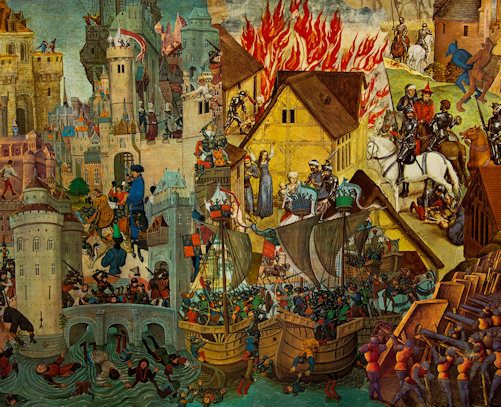 1
1
When at home I long to travel, on trips I pine for home. Thank you Lord for these twin dissatisfactions, and this vagabond moon blessing my feet.
2
The couple in the Lima Airport entwined under an orange blanket at 2:00 a.m. She plucks rogue hairs from his eyebrows then snuggles closer, all satisfaction, like a maid who has just cleaned a mirror.
3
One oft-neglected lesson of St. Teresa of Avila, the original flying nun: stay rooted. Whenever she lifted off the ground, thus threatening to re-join God prematurely, her sister nuns yanked her back to earth. And to teach herself humility, she once put a saddle on her back, a bridle in her mouth, and muled through her day, on all fours, a beast of burden.
4
Christmas morning, Cuzco, lying in bed in an Airbnb, in a sprawling house owned by a family of seven. Birds chirping, my wife’s breath centers the room. I’ve just watched the nine-year-old son beat a rat in the courtyard with a baseball bat. Nine crushing blows. I counted. No blood visible from here, but a much flatter rat. Now, bread bag over his hand, the boy sacks it up, as if casually disposing of dog doo doo. A gift for his mom? An offering to the Christ child in his Christmas crèche beside the bike rack? Seven blocks away, thousands of Incan peasants from mountain villages doze in the street, after a week of sell sell sell. Here on the bunk bed, my daughter stirs. That’s right, I have a daughter, whose breath was so cleanly quiet I forgot to mention her. She looks me over now, as if I were a broken suitcase, then reaches for a book. My wife sleeps on. Why should I feel so happy? Maybe sunlight, maybe this tranquil hush, like the elbow of a slow river where a believer enters the water to be baptized. There are worse things to be in this life than a broken suitcase. Shouldn’t I have to corroborate my good cheer with the flea bites on my thigh? Shouldn’t I be required to master Quechua before opening my mouth?
5
When his son fell into a well, San Isidro didn’t pray the deed undone, but asked for the water to rise—and the infant floated up into his arms.
6
Walking down a narrow Cuzco alley, my teenage daughter leans into me, which means she’s cold or tired or a little scared. Maybe all three. And yet, what father doesn’t hoodwink himself into calling this love and snuggling closer?
7
Speaking Spanish again I grow simple. No nuanced inquiries about Cesár Vallejo or Incan culture, no speculation about the peasant underpinnings of Shining Path. Instead, me gustan las uvas, I like grapes. Grapes, and the beach, and the hat you’re wearing. Also the color green, as in this grass and that uniform, as in the wreath on the Peruvian flag. Back home, I like complicated metrical patterns in poetry, and will again. But here not so much. Here me gustan las uvas, especially the red ones, also trains and llamas. Did you have a merry Christmas? I am hungry, are you hungry too? I want ham for lunch but ham sounds a lot like soap. I’m afraid to say anything. And now I’m either embarrassed or pregnant. Peine or pene? Your comb or my penis? One of them has an extra vowel.
8
The Virgin on San Cristóbal Hill in Santiago, Chile. At forty-two feet in height and thirty-six tons of cast-iron painted white, she’s no sissy. From far away travelers lift their eyes to her, then to the heavens. Up close, she has permanent rungs up her back. So repairmen can touch her up with paint, so angels don’t have to hover when they adjust her invisible halo.
9
If you visit Pablo Neruda’s upstairs study in Valparaiso, you’ll notice a portrait of a certain nineteenth-century bearded poet fond of singing himself—that is when he isn’t celebrating himself. And behind the portrait, a hidden door near the ceiling. But a door to what? To the unbuilt heliport, of course, which the architect hoped to add a few decades later when personal whirligigs promised to fill the sky like passenger pigeons over Nebraska. The house has five levels, and was infamously designed to resemble a ship at sea, everything about it implying voyage. So why not have a study that doubles as a landing pad? Why not designate your personal portal to the heavens Mr. Whitman?
___
Lance Larsen is the author of five poetry collections, most recently What the Body Knows (Tampa 2018). He’s the recipient of a Pushcart Prize and fellowships from Ragdale, Sewanee, The Anderson Center, and the National Endowment for the Arts. Six of his essays have been listed as notables in Best American Essays. “Aphorisms for a Lonely Planet” is a selection from a book manuscript by the same name, excerpts of which have appeared in Southern Review, Hanging Loose, Short Circuits, and Tampa Review. In 2017 he completed a five-year appointment as Utah’s poet laureate. He teaches at Brigham Young University, where he serves as department chair.
Artwork by John Gallaher

3 comments
Donna Steiner says:
May 17, 2018
Wonderful.
Timothy Kenny says:
May 17, 2018
Thoughtful, hopeful, beautiful.
Grant says:
Jun 2, 2018
Lovely. Wish I would have visited Neruda’s place when I was in Valparaiso… Rode that tram though.